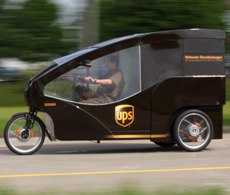UPS Germany is testing an electrically supported loading bicycle in the city centre of Dortmund,North Rhine-Westphalia, from mid-June until October 2012, to see if it can be deployed as an
economically and ecologically useful alternative for urban deliveries.Called ‘Cargo Cruiser’, the electric bicycle will be initially deployed in the City-East area ofDortmund, with special loading zones placed at twenty stops in the marginal area of the city centrewhere a conventional UPS delivery vehicle loads the Cargo Cruiser with parcels. Finally, a UPSdriver covers the “last mile” to the end-customer with the Cargo Cruiser. This simplifies thedelivery of parcels in the narrow streets of the inner city which often offer only a few parking orstopping possibilities for bigger vehicles.
Thereby, UPS reduces the emission and noise pollution in the areas where the Cargo Cruiser isdeployed and thus eases the traffic situation. The deployment of the eco and user-friendly CargoCruiser is due to be extended to more areas later.
At night, the batteries of the Cargo Cruiser are recharged at a standard 220-volt power socketto reach a cruising range of around 35 km again the next morning, with a load volume of 2.2 m3 anda possible payload of 300 kg. The speed is controlled at below 25 km/h.
This latest trial is part of UPS Germany’s participation in the Green Logistics project focusingon eco-efficient planning of delivery routes. A study within the project revealed that anelectrically supported loading bicycle (Cargo Cruiser) is a promising way to create an ecologicallyand economically sensible alternative for deliveries within urban areas. The Economic DevelopmentAgency of Dortmund supports the implementation of the project on site.
In addition, UPS plans to deploy another electric delivery vehicle in the city centre ofDortmund to replace a diesel parcel truck.












